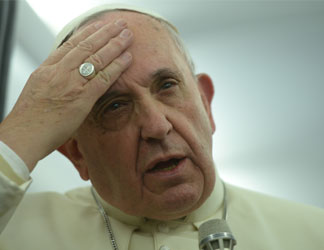
Pope Francis took three families of Syrian refugees back to Rome on Saturday after visiting the frontline of Europe’s migrant crisis at a camp in Greece where migrants wept at his feet, kissed his hand and begged for help.
At a sprawling fenced complex on the Aegean island of Lesbos, adults and children broke down in tears before the head of the Roman Catholic Church, after their onward journey to Europe was cut short by an EU decision to block a migrant route used by a million people fleeing conflict since early 2015.
While borders have now largely been shut for migrants, Francis symbolically took a small group of refugees with him on his aircraft as he left the island after a five-hour visit.
“The Pope has desired to make a gesture of welcome regarding refugees, accompanying on his plane to Rome three families of refugees from Syria, 12 people in all, including six children,” a Vatican statement said, adding that they were all Muslims.
The pope told reporters on the plane back from Lesbos that it had been the idea of one of his aides and that he had immediately agreed.
“I felt the spirit was talking to us,” he said, adding that “everything was done according to the rules”, with documents provided by Italy, the Vatican and Greece.
Asked why they were all Muslim, he said there was something wrong with the papers of a Christian family that had originally been on the list.
The refugees had arrived on Lesbos before a deal between the EU and Turkey came into effect to halt the migrant flow on March 20 and were staying at a different, open camp on the island.
The pope stressed that taking them to Rome was a humanitarian, not a political, gesture.
Sant’Egidio, a Christian community which offers help for those in need and is headquartered in Rome, will help the families to settle and to find jobs but the costs will be covered by the Vatican, Francis said.
“YOU ARE NOT ALONE”
Earlier Francis, leader of the world’s 1.2 billion Roman Catholics, shook hands with hundreds of people as hundreds more were penned behind metal barriers at the Moria camp. It holds a total of about 3,000 people.
“Freedom, freedom,” migrants chanted as he walked through the hillside facility in scorching sun. Some women ululated.
“I want to tell you, you are not alone,” he told them.
“As people of faith, we wish to join our voices to speak out on your behalf. Do not lose hope!” he said, flanked by Patriarch Bartholomew, spiritual leader of the world’s Orthodox Christians, and Greek Archbishop Ieronymos.
On at least three occasions, adults fell to the feet of the pontiff, weeping and begging for help. One woman wearing a crucifix broke through a police cordon and flung herself at Francis’s feet.
“No camp, no camp,” sobbed the woman, who appeared to be in her early thirties. “I want to go.”
In a tent where Francis met with migrants, a little girl with pigtails dressed in pink and white bowed at his feet. As he helped her up, she cried uncontrollably. An adult man broke down. Migrants slipped pieces of paper into his hand as F Francis passed by, which he handed to an aide.
The pope later told reporters the experience was “to cry for”.
The pope has often defended refugees and urged Catholic parishes in Europe to host them. His first trip after becoming pontiff in 2013 was to the Sicilian island of Lampedusa, which, like Lesbos, has received thousands of refugees.
Hundreds of people have died making the short but precarious crossing from Turkey to the Lesbos shores in inflatable dinghies in the past year, and the island is full of unmarked graves.
Francis and Orthodox leaders threw wreaths into the sea to commemorate those who have died
END

Be the first to comment